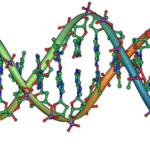1. Olaparib led to a bigger decrease in pain interference and symptomatic skeletal-related events than hormonal drugs.
2. Olaparib demonstrated a bigger increase in median time to first opiate use for cancer-related pain and in quality of life than hormonal drugs.
Evidence Rating Level: 1 (Excellent)
Study Rundown: The PROfound study previously examined men with metastatic castration-resistant prostate cancer, who had an alteration in a prespecified homologous recombination repair gene and who had progressed on a hormonal drug regimen. Patients were randomly assigned to receive olaparib (a poly(adenosine diphosphate–ribose) polymerase inhibitor) or a hormonal drug of the physician’s choice (enzalutamide or abiraterone). They were further divided into cohort A (those with gene alterations either in BRCA1, BRCA2, or ATM) and cohort B (those with alterations in at least one other homologous recombination repair gene). This study expanded upon the aforementioned trial by examining pain and quality of life measures in patients in cohort A. Pain and quality of life were assessed by the Brief Pain Inventory-Short Form (BPI-SF) and the Functional Assessment of Cancer Therapy-Prostate (FACT-P), respectively. Median time to pain progression and median time to first opiate use for cancer-related pain were significantly increased in the olaparib group. Pain interference scores and symptomatic skeletal-related events were decreased in the olaparib group. Despite a previously mentioned increase in adverse events grade 3 or higher with the olaparib group, there was an increased quality of life benefit when compared to the control group. Limitations to this study include variability in each physician’s choice of hormonal drug, a small sample size, and a short enrolment window to the study. The strength of this study is the limited bias due to the design and that it showed a strong benefit to patient-centric health-related quality of life measures. Overall, olaparib is a viable treatment option due to its increased clinical and quality of life benefits over hormonal drugs.
Click to read the study in The Lancet Oncology
Relevant Reading: Olaparib for metastatic castration-resistant prostate cancer
In-Depth [randomized control trial]: The PROfound study was an open-label, phase III international randomized control trial that included 387 patients with metastatic castration-resistant prostate cancer with alterations in repair genes and who had progressed on a hormonal drug regimen. Patients were divided into two cohorts; 265 were placed in cohort A (those with alterations in BRCA1, BRCA2 or ATM) and 142 in cohort B (those with alterations in at least one other homologous recombination repair gene). In cohort A, patients were randomly assigned in a 2:1 ratio to receive olaparib or hormonal drugs of the physician’s choice (enzalutamide or abiraterone). This study expanded upon the PROfound study and investigated pain and quality of life measures in cohort A patients. The olaparib group had a higher proportion of men with clinically meaningful improvements in FACT-P total scores (10% vs. 1% in the control group; odds ratio 8.32; 95% CI, 1.64 to 151.84; P=0.0065) and consistently higher scores throughout the trial. Median time to pain progression (collected from the BPI-SF) was not reached in the olaparib group and was 9.92 months in the control group (hazard ratio [HR], 0.44; 95% confidence interval [CI], 0.22 to 0.91]; P=0.019). Median time to first opiate use for cancer-related pain in patients who did not use opiates at baseline was 18.0 months for the olaparib group and 7.5 months in the control group (HR, 0.61; 95% CI, 0.38 to 0.99; P=0.044). The difference in pain interference score (calculated from the mean of all BPI-SF items) between treatment groups after the adjusted mean change from baseline score was -0.85 (95% CI, -1.31 to -0.39, P=0.0004). Symptomatic skeletal-related events occurred in 15% and 23% of patients in the olaparib and control groups, respectively (HR, 0.37; 95% CI, 0.20 to 0.70; P=0.0013). Overall, olaparib not only shows a stronger clinical benefit than hormonal drugs, but also an increased benefit to the quality of life for patients with metastatic castration-resistant prostate cancer with alterations in repair genes and who had progressed on a hormonal drug regimen.
Image: PD
©2022 2 Minute Medicine, Inc. All rights reserved. No works may be reproduced without expressed written consent from 2 Minute Medicine, Inc. Inquire about licensing here. No article should be construed as medical advice and is not intended as such by the authors or by 2 Minute Medicine, Inc.


